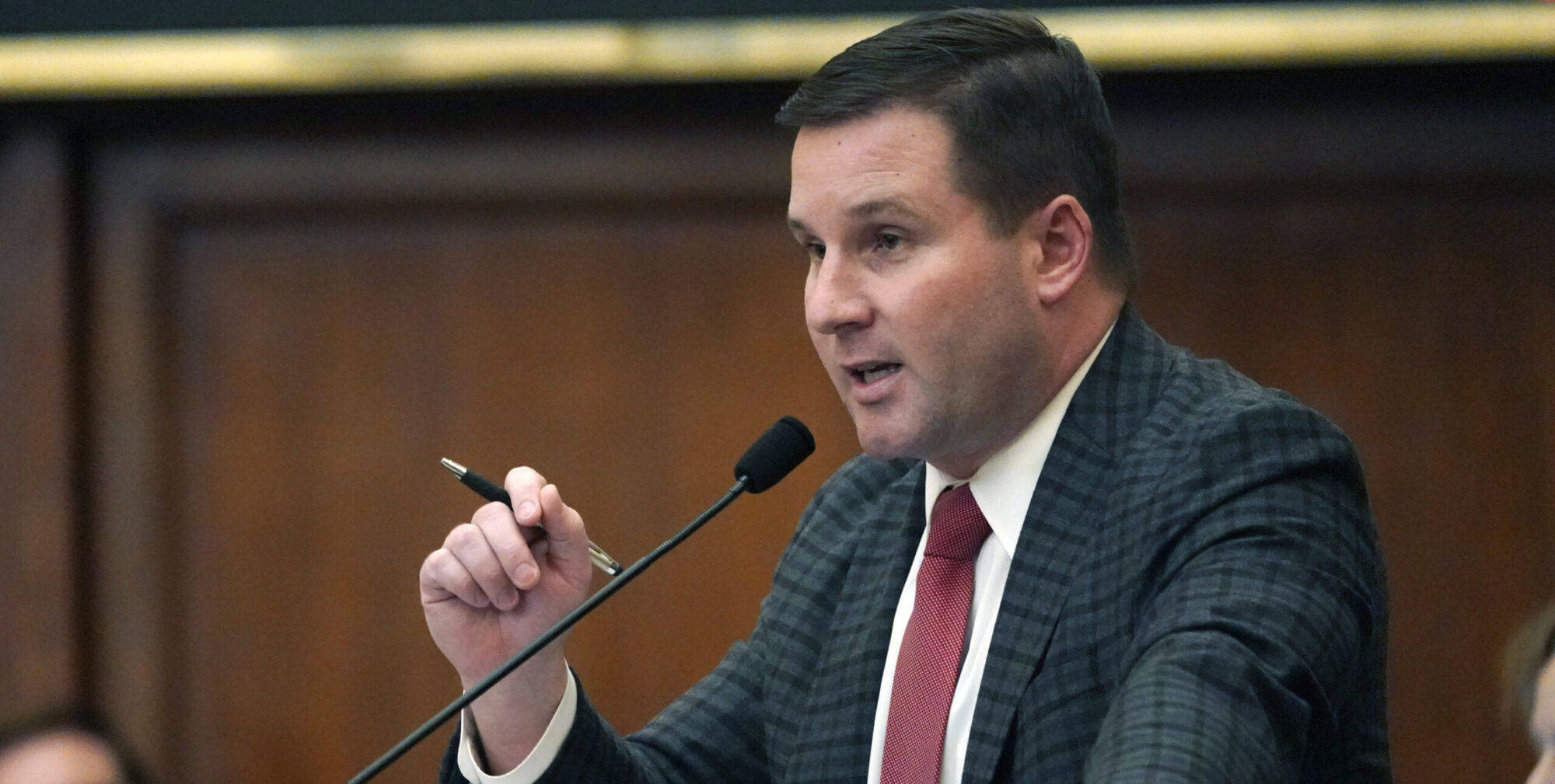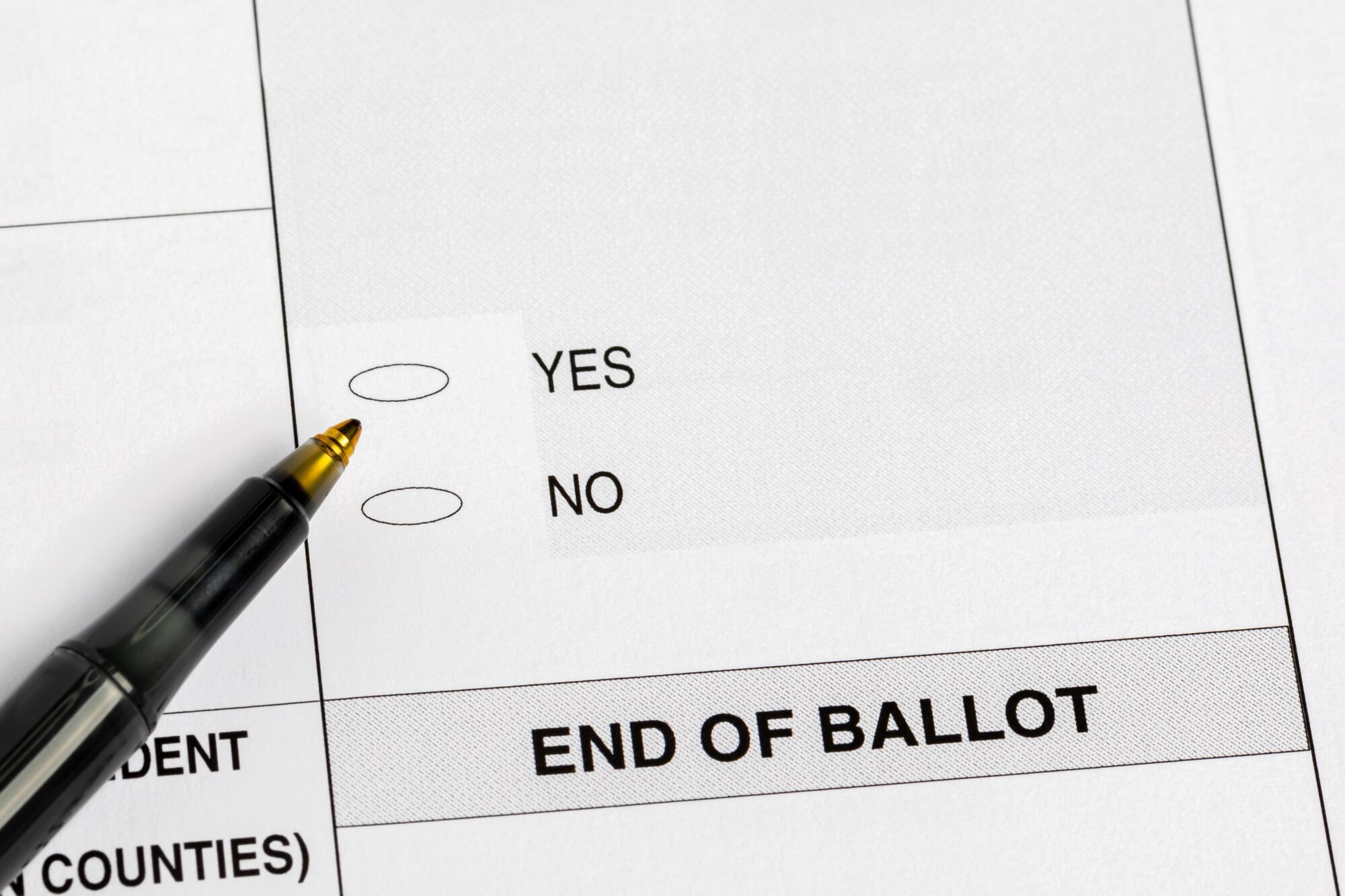
Ways and Means Committee Chairman Trey Lamar, R-Senatobia, (AP Photo/Rogelio V. Solis - Copyright 2023 The Associated Press. All rights reserved.)
- Critics question whether the state should be in the alcohol warehousing business at all.
On Monday, Governor Tate Reeves (R) signed into law a bill to fund the construction of a new Alcohol Beverage Control (ABC) warehouse with $95 million in state bonds. To pay the bonds, fees on liquor distillers are being raised.
Mississippi is one of 17 states that exerts direct control over the sale and distribution of alcohol, a remnant of Prohibition-era policy. The state maintains a monopoly on the importation and distribution of any distilled spirit or a wine product that contains more than 5% alcohol by weight. Every bottle legally sold is routed through a single state-owned warehouse, currently located in Gluckstadt, Mississippi. Licensed package retailers must purchase the liquor and wine they sell directly from the state.

The ABC warehouse has been a point of contention for a number of years, as lawmakers have repeatedly been told by the Department of Revenue that to increase efficiency and improve distribution, a modern, larger warehouse is needed to accommodate demand.
According to the Department of Revenue, ABC distributes over 3 million cases of spirits and wines annually from its 211,000 square foot warehouse, serving over 600 off-premise accounts and 1,500 on-premise accounts and offering over 3,800 stocked items and 14,400 special order items in various sizes.
State Rep. Trey Lamar, author of HB 1354, told Magnolia Tribune state-of-the-art equipment simply will not fit in the current warehouse.
“You’d have to take the top off, raise it, and add on to the back. By the time you do all of that, you might as sell that one and find another location to build on,” Lamar said.
Two years ago, the Legislature passed a measure to contract out the operations at the warehouse. It also required the Department of Revenue to consult with the new contractor on what is needed for a new warehouse and authorized up to $55 million in bonds to build the facility.
With the new contractor in place, lawmakers have now been told the warehouse may cost $40 million more than the estimate two years ago. In view of that information, HB 1354 pushed that total bonding limit for the project up to $95 million.
The conference report on the bill passed the House by a vote of 112-4 and the Senate by a vote of 43-4.
In a letter to the Governor, three trade organizations – the American Distilled Spirits Alliance (ADSA), the Distilled Spirits Council of the United States (DISCUS) and the Wine Institute (WI) – had urged Reeves to veto HB 1354 to “avoid another unfair and unnecessary increase in the state bailment fee on every case of wine and spirits coming into” the ABC warehouse. A bailment fee is a fee for the storage of a product.
“The Mississippi Legislature just voted to raise prices on every bottle of wine and spirits in the state by passing a 50% bailment fee increase and has now put this tax increase on your desk,” the organizations wrote to the Governor. “The new fee would be $1.50 per case which is up from $1.00 in 2022. Prior to 2022, there was no such tax in the great state of Mississippi.”
The three groups argue that what lawmakers passed was not a bailment fee, but rather “a clear tax on an entire private industry to pay for a public facility.”
“To make matters worse, HB 1354 has no sunset date even after the new facility is built and paid for, where at that time this tax will go to the state’s general fund,” the groups wrote to the Governor. “The Legislature is asking private manufacturers to pay for a public warehouse that, over the bonding period, will cost manufacturers more than $152 million.”
Rep. Lamar said lawmakers have consistently told the public that if a new warehouse is built, the funds would not come from the general fund.
“If we’re going to do this, we’re going to make the people who participate and who make money off of the sale of alcohol in the state pay for it,” Lamar said. “We’re keeping our word. My grandmother or someone else’s grandmother who’s never bought a bottle of liquor in her life, that her taxes don’t go to pay for a liquor warehouse.”
Prior to two years ago, there was no bailment fee collected in Mississippi. Rep. Lamar noted that since then, those funds have been collected and placed into a special fund solely designated to pay back the bond and properly equip and maintain the new warehouse.
Rep. Lamar said the increase of the bailment fee in HB 1354 is a direct result of increasing the total authorized bond limit by $40 million. He said lawmakers “15 to 20 years from now” are free to decide to reduce or end the bailment fee once the bond is paid down. Lamar argues that keeping a bailment fee at some amount should be considered since “not having one for 20 or 30 years, or however long we didn’t have one, is kind of what got us in this mess to begin with.”
The newly minted bailment fee is not the only tax on alcohol in Mississippi. Indeed, alcohol has been taxed at higher levels than most products sold in the Magnolia State for quite some time. In Fiscal Year 2023, the state collected almost $120 million in fees from the sale of liquor and wine, including a 27.5% markup on every bottle sold, as well as licensing and permit fees, and excise taxes of $2.50 per gallon of liquor, $1.00 per gallon of champagne, and $0.35 per gallon of wine.
Of that, $105 million were transferred to the state’s general fund in 2023. Additionally, the state collected nearly $38 million in sales taxes from wine and liquor stores, the vast bulk of which also goes into the state’s general fund.
Separately, the state collected over $27 million in excise taxes on the sale of beer and “light wine” that can be sold in grocery and convenience stores. The sale of beer and light wine also accounted for a portion of the $408 million in sales taxes collected from grocery and convenience stores.
One of the few lawmakers voting against building a new state warehouse was State Rep. Dan Eubanks (R). He questions whether being in the alcohol business is a core function of state government, asking if Mississippi should be in that role beyond enforcement and taxation.

“It’s certainly not free market, the state being in the alcohol business to begin with,” Eubanks told Magnolia Tribune. “We could privatize that, sell it off. Heck, take that money and put it in PERS, whatever you need to plug a hole, but just the whole idea of us being in the alcohol business and throttling the free market is my issue. I couldn’t vote for something that just continues the same broken system on principle.”
Rep. Eubanks said he believes it’s time the state divest itself of the whole system.
Starla Brown, State Director for Americans for Prosperity, agrees with Eubanks. She said the whole process should be handled through private industry, not state government.
“We don’t think the state government should be in charge of the flow in or out of the state. We take a free market approach to that. I know very few places in the country that have such government control over what can be charged, where it can be purchased, how it comes in and out of the state,” Brown said. “So, we think the free market is best for this, and individuals, whether they are a liquor store owner or the people who warehouse and move the products, we believe that should be private industry and not a government industry.”
Rep. Lamar, too, agrees that state government should not be in the alcohol warehousing business. In fact, he noted that the House of Representatives has passed bills in previous sessions aimed at privatizing the operation, while leaving ABC only with the enforcement side.
“We couldn’t ever get the Senate to go along with that,” Lamar said.
With the signing of HB 1354, the state of Mississippi will remain in the alcohol warehousing business for the foreseeable future as the legislation mandates that the design of the new facility should meet demand for the next 25 years.
The measure also outlines that a contract for the new ABC warehouse construction is to be entered into no later than October 1st of this year.









